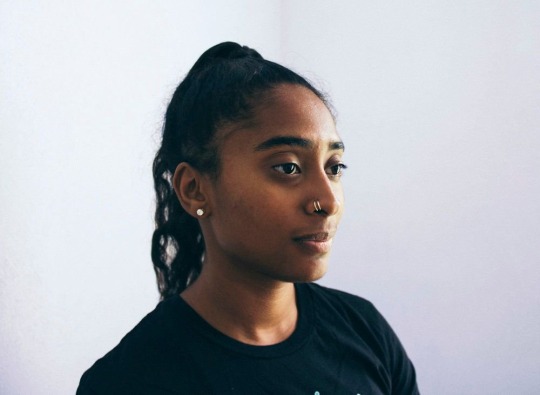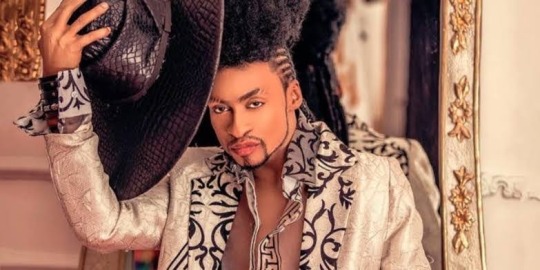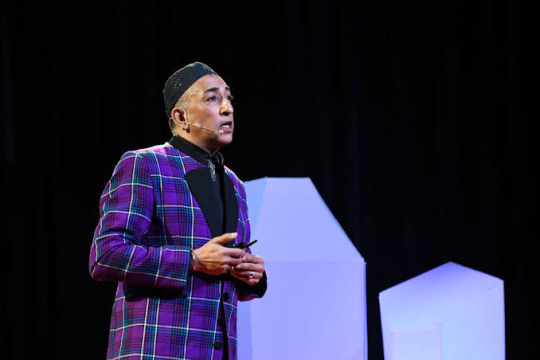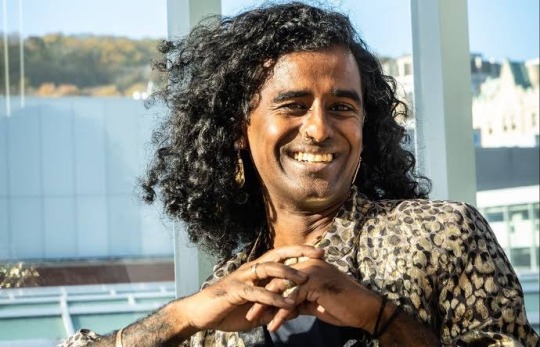#El Farouk-Khaki
Explore tagged Tumblr posts
Text



"For as long as I remember I've had people tell me that you can't be gay and Muslim... [but] Muslim history is rich with queer people." - El Farouk-Khaki
77 notes
·
View notes
Photo

El-Farouk Khaki
Gender: Male
Sexuality: Gay
DOB: 26 October 1963
Ethnicity: Indian
Nationality: Tanzanian / Canadian
Occupation: Lawyer, activist
Note: Founded Salaam, the first gay Muslim group in Canada and second in the world
#El Farouk Khaki#qpoc#homosexuality#lgbt#lgbtq#male#gay#1963#indian#asian#poc#Tanzanian#canadian#lawyer#activist#muslim#first
91 notes
·
View notes
Text
List of notable Muslim allies of queer, trans or LGBTQI+ folks
Imam al-Nawawi – ally of Mukhannathun or trans femmes, female transsexuals and effeminate queers
Saint Khawaja Gharib Nawaz – ally and patron of Hijra and Khawaja Sara communities
Saint Baba Bulleh Shah – ally and patron of Muslim Khawaja Sira communities
Saint Lal Shabaz Qalander – patron of Khawaja Sira & trans Muslim communities
Abu Muhammad Ali Ibn Hazm – ally of queer Muslims
Ayatollah Ruhollah Khomeini - ally of transgender & intersex folks
Sheikh Muhammad Sayyid Tantawi - ally of trans & intersex folks
Amina Wadud - ally of LGBTQI+ Muslims, founder of Queer Islamic Studies and Theology (QIST)
Gulbanu Khaki/Gul Khaki - ally of LGBTQ+ muslims, mother of a gay imam
Khaled Hosseini - ally of transgender & proud muslim dad of a transgender child
Siddika Jessa - LGBTQI+ activist, mother of a gay muslim son
Ani Zonneveld
Pamela Taylor
Laura Silver
Omid Safi
Kecia Ali
Ghazala Anwar
Ensaf Haider
Saleemah Abdul-Ghafur
Farid Esack
Zaitun Mohamed Kasim/Toni Mohamed Kasim
Anne-Sophie Monsinay
Imam Kahina Bahloul
Imam Philip Tuley
Scott Siraj al-Haqq Kugle
Farouk Peru
Abdennur Prado
Ingrid Mattson
Hasan Minhaj
Reza Aslan
Alia Bano
Zaid Ibrahim
Azahn Munas
Ayman Fadel
Inayat Bunglawala
Shahla Khan Salter
Nakia Jackson
Jeewan Chanicka
Taj Hargey
Michael Muhammad Knight
Maajid Nawaz
Shehnilla Mohamed
Mustafa Akyol
Writer Sabina Khan
Activist Jerin Arifa
Urvah Khan - LGBTQI+ ally, co-founder of Muslim Pride Toronto
Imam Khaleel Mohammed
Imam Tareq Oubrou
Imam Dr Rashied Omar
Shaykha Fariha Fatima al-Jerrahi
Shaykha Amina Teslima al-Jerrahi
Scholar Hussein Abdullatif
Maysoun Douas
Fátima Taleb
Aydan Özoğuz
Omid Nouripour
Özcan Mutlu
Ekin Deligöz
Cem Özdemir
Artist Nadia Khan
Marina Mahathir
Siti Musdah Mulia
Karima Bennoune
Grand Mufti Sheikh Assadullah Mwale
Muneeb Qadir
Dr. Amir Hussein
Dr. Sana Yasir
Dr. Sali Berisha
Dr. Omer Adil
Hashim Thaçi
Albin Kurti
Supermodel Nadia Hussain
Irish-Bangladeshi singer Joy Elizabeth Akther Crookes
Salma Hayek
Fouad Yammine
Pakistani Director Asim Abbasi
Pakistani Actress Nadia Jamil
Indian Actor Saqib Saleem
Indian Actor Irrfan Khan
Indian Actor Aamir Khan
Indian Actress Zeenat Khan/Aman
Indian Actress Shabana Azmi
Indian Actress Saba Azad
Indian Actress Sara Ali Khan
Indian Actress Huma Qureshi
Indian Director Zoya Khan
Pakistani Actor Furqan Qureshi
Bangladeshi Actress Azmeri Haque Badhon
Actor Muneeb Butt
Indian Actress Zareen Khan
Indian Actor Imran khan
Pakistani Actress Mehar Bano
Filmmaker Faruk Kabir
Filmmaker Saim Sadiq
Filmmaker Sharmeen Obaid-Chinoy
Riz Ahmed
Zayn Malik
Sally El-Hosaini
Malala Yousefzai
Hafid Abbas
Hojatoleslam Kariminia
Singer Sherina Munaf
Writer Alifa Rifaat
Writer Ismat Chughtai
Activist Nida Mushtaq
Activist Aan Anshori
Abdul Muiz Ghazali
Kyai Hussein Muhammad
Marzuki Wahid
Gigi Hadid
President Abdurrahman Wahid (Gus Dur) - ally of waria or transgender females
Sinta Nuriyah - ally of trans & waria folks
Politician Keith Ellison
Mayor Sadiq Khan
Politician Ilhan Omar
Politician Rashida Tlaib
Politician Rushanara Ali
Politician Nabilah Islam
Politician Shahana Hanif
Politician Rama Yade
Politician Humza Yousaf
Politician Zarah Sultana
UK Sectratary General Zara Mohammed
Turkish politician Kemal Kılıçdaroğlu
Bengali Influencer Sobia Ameen
Shaykh Michael Mumisa
Muhammad Musharraf Hossain Bhuiyan
Mufti Abdur Rahman Azad - Hijra ally
Sheikh Hasina - Ally of hijra-intersex communities
Lawyer Iftikhar Chaudhry
Amani Al-Khatahtbeh
Professor Amel Grami
Professor Muhammad Aslam Khaki
Mohammad Hashim Kamali
Mehrdad Alipour
Lawyer Imaan Mazari/Iman Mazari
Shireen Mazari
Syed Murad Ali Shah
41 notes
·
View notes
Text
I’m in like intermittent periods between extreme excitement and procrastination because I am really, really, really working on this show. I got El-Farouk Khaki who if you don’t know, is a queer muslim human rights immigration lawyer who ran for NDP in 2008. Among many things I am so excited to interview him! I’ve never had a formal interview before so I’m looking up how to do it ahhhh
I’ve been working on it so much my hands are like permanently cramped so I should probably look into that tbh haha ha...
2 notes
·
View notes
Note
I really just... need some direction, because I have no idea where to really start with this and how to learn more, and it all feels very overwhelming. I apologize if this is at all inconveniencing! (3/3)
I think it’s also just important when you may get overwhelmed and run into homophobic, transphobic etc. people and ideas to understand that there are muslims who are working against these things. I’m grateful for the presence and work of individuals such as Mahdia Lynn, Mona Eltahawy, Dr. Ingrid Mattson, Fatimah Asghar, Blair Imani, Sh. Daayiee Abdullah, El-Farouk Khaki, Dr. Scott Kugle, groups like Muslims for Progressive Values, literally all of the lgbtq+ muslims here on tumblr (seriously, there is a great community of people here).... anyway idk if i’m making much sense other than just rambling on or if I’ve answered your question(s) but please feel free to ask me anything else if you need or wish so and I wish you the best. And don’t let anyone tell you that you have to deny or negate any integral part of your identity in order to be a muslim, if that is what you choose to do.
2 notes
·
View notes
Photo

What It’s Like To Pray At A Queer-Inclusive Mosque
Buzzfeed has posted an illuminating article from contributor Davide Mastracci, about the Unity Mosque in downtown Toronto (the precise location of which is secret, to prevent harassment from non-sincere participants). It is a safe space for queer Muslims who may feel obligated to hide their identities when entering other mosques.
In their Friday services, “anyone can give the call to, or lead, prayer. There is no gender segregation....”
Says a bisexual Islam-convert Renée Mercuri, “It was very clear within minutes that everyone was welcome. Your Islam is your Islam. It doesn’t have to be prescribed. You follow this path in whatever way you feel comfortable.”
Co-founded by a queer refugee lawyer (El-Farouk Khaki), the mission statement is: “While the Unity Mosque is an alternate space for Muslims, it is not meant to be a competing ideology. It is a place of refuge, not protest. For many, its existence is what has allowed them to keep faith.”


Read the full article here.
475 notes
·
View notes
Link
0 notes
Text
Sawyer’s Film Review: Sex, Sin and 69
Sex, Sin and 69: Critical Film Review
GNDS 125: Gender, Race and Popular Culture
By Sawyer Bailly (20152498)
Through interviews and monologues from various queer academics, historians, and activists, the documentary Sex, Sin and 69 looks back on the 1969 legislation to “decriminalize” homosexuality and explores the misconceptions surrounding decriminalization and what it meant for the LGBTQ+ community in Canada. Throughout the film, narrator Fawzia Mirza takes the audience through the evolution of the gay rights movement in Canada, including various acts of discrimination by the Canadian government. This narration is accompanied by the voices of multiple contemporary players in the LGBTQ+ community, each of which contribute their own experiences of existing in Canada as well as their perspectives on sexuality and gender. The film also includes coverage of trans and intersex history and struggles, in which it challenges gender norms and binary ways of thinking. Topics such as colonization, Aboriginal history, and racism are also touched on. 69, despite several shortcomings regarding intersectionality and exploring decriminalization in depth, does an excellent job of shedding light on uncomfortable and dark moments in Canadian history- and because of this, it is a must see.
Something that I felt 69 addressed well was the importance of inclusivity- and the fact that this issue was not solved by decriminalization. Early on in the film, an interviewee spoke about his experience as a closeted gay man living in Kingston over twenty years ago and described the solace and sense of community he found in gay bars. He recounted his experiences sneaking in the back door to one of these bars, where he would ring a bell to tell the bartender to let him in. Gay bars were not simply a place to drink and dance: they were places in which people could connect with others with shared or similar experiences and exist unapologetically. In a social climate in which there were very few inclusive spaces for LGBTQ+ individuals, gay bars were where many felt safe and welcome, rather than feeling that their identity was in question or perceived as “abnormal”.
Throughout the rest of the film, the importance of safe spaces continued to be emphasized- places where one need not worry about their identity being questioned or treated as “different”, where they are simply not “in question” (Ahmed 120-21). At a time when gender or sexuality that did not fit with the “norm” of cisgender heterosexuality was violently unaccepted, it was crucial for people who identified as LGBTQ+ (although this terminology did not exist at the time) to find safe spaces within their communities, where there could be constructive discourse about positive change. The Body Politic, a newspaper advocating for gay rights, was presented as an example of an inclusive space. Again, however, decriminalization did not prevent places like this from being targeted by the police force and the public.
Something that 69 fell short in was its time spent on intersectionality. While there were a few discussions regarding intersectionality, such as lasting colonial effects stemming from the treatment of Two-Spirited individuals by the Christian church, these discussions were fairly brief, and the movie remained mainly dominated by “white” movements. After the detailing of the colonizer’s treatment of Two-Spirit Aboriginal people, the film rarely made specific reference to any marginalized groups within the LGBTQ+ community in the years before and after the legislation. The narration scored video clips and photos of white-driven protests and individual players, such as Jim Egan, that did not accurately capture the intersectionality existing in all of these points in the gay rights movement. The privilege that comes along with existing as a white LGBTQ+ individual was hardly acknowledged, in past or present tense, and it seemed as though the filmmakers had not made a significant effort to examine the events leading up to the 1969 legislation, or those shortly after, through an intersectional lens.
It would be incorrect to say that 69 did not touch on intersectionality at all. One of the interviewees, El-Farouk Khaki, spoke about his identity as a gay, Muslim man and his experiences of multiple forms of oppression in unison. Intersectionality was again touched on near the end of the film, in which the marginalization of black LGBTQ+ women was addressed and the movements that have sprung up as a result of this oppression. These were valuable moments in the film that I wish I had seen more of. However, it is safe to say that any examination of social injustice or oppression is incomplete without every aspect being analyzed through an intersectional lens, as it helps us to understand the complexity of oppression in our society (Kaufman)
Another strong point of the film was the time spent on a discussion surrounding intersex individuals, the dangers of binary thinking, and the evolution of the rights of people who are transgender. I felt that the film did an excellent job of challenging gender normativity as well as the cissexism that exists in many aspects of society, such as the genital procedures done non-consensually by doctors on intersex babies.
I believe that the misconceptions surrounding Bill C-150 were handled well. Never was it argued that decriminalization was a cure all for homophobia; most of the interviewees only acknowledged that it was a step in the right direction. Trudeau’s declaration 'there's no place for the state in the bedrooms of the nation', seemed to be revered as a revolutionary statement that changed the game in the gay rights movement and was the catalyst for decriminalization. In terms of explaining the bill itself, the film did an excellent job of detailing its benefits as well as its faults. The overall consensus, however, seemed to be that it was the step that, realistically, was ‘right’ for the time. Before the credits rolled at the end of the film, a brief message appeared explaining that several people had declined to be in the film as they believed that decriminalization was not a positive thing and that the premise of the film was problematic. I would have liked to hear perspectives such as these in greater detail, so that I could have a more multidimensional understanding of decriminalization.
That being said, I would definitely recommend this film for its exposure of a widely unknown chapter in Canadian history, as it is important for everyone to understand events such as these in order to move forward in creating a better future. Despite the fact that, like any other film, it has its shortcomings, it is worth a watch and has many moments of great value to any viewer.
Word Count: 1077 (with in-text citations)
References
Ahmed, Sara. "Being in Question" in Living a Feminist Life. Durham: Duke University Press, 2017.
https://read.dukeupress.edu/books/book/1933/chapter/191590/Being-in-Question
Kaufman, Peter, 2018. “Intersectionality for Beginners.”
https://www.everydaysociologyblog.com/2018/04/intersectionality-for-beginners.html#more
0 notes
Text
Article 6
https://www.nbcnews.com/feature/nbc-out/affirming-mosques-help-gay-muslims-reconcile-faith-sexuality-n988151
In this article by Finbarr Toesland writes an article about a new LGBTQ friendly mosque. This mosque is known as Unity Mosque and 10 years ago it began to allow all LGBTQ member Muslims to come attend prayer without having to hide their sexual orientation or gender identity. These members are able to attend this mosque without any fear of discrimination from the mosque or its attendees. Imam El-Farouk Khaki was one of the co-founders of this inclusive mosque and he explains why he started this mosque by saying “’I wanted a Muslim space that welcomed all humans and celebrated human diversity’”. This mosque has no dress code for women, no gender segregation and women regularly lead the Friday prayers, all things that Unity Mosques does which keep it far from how other mainstream mosques operate. When opening in 2009, Unity Mosque was the only LGBTQ inclusive mosque that Khaki had heard of although he felt that other mosques would soon follow his lead thus changing the way the Muslim community includes others and operates. He started to notice this trend of inclusion by the people of his faith, even commenting that “’more and more groups, communities, and mosques that celebrate and embrace inclusion and diversity are forming’”. Through the efforts of Khaki and other inclusive mosques more and more sexual and gender minority Muslims are coming back to mosque and are reconciling their religion with their personal identity.
This is such an amazing change in today’s world because as we talked in class, Muslims tend to not support and even condemn members of the LGBTQ community. When looking at the voting patterns and political alignment of American Muslims, trends of anti-LGBTQ voting and policy making can be found. The majority of Muslims still do disprove of people within the LGBTQ community however it is very clear to see that change is in fact coming to this faith community. Scholars have been studying the Quran thoroughly in order to find what the text says and how people may interpret it, with the hopes of finding that the Quran does not actually condemn homosexuality like many Muslims believe.
0 notes
Text
Toronto Edition: Unity Mosque
Unity Mosque is a LGBTQ mosque in downtown Toronto where queer Muslims who usually haven’t found spaces within other religious congregations come together in a safe space for Friday service. There is no specific dress code, no spiritual expectations, women lead the service and the prayer, and members can even Skype into the service[1]. It is one of the leading mosques in providing safe religious and spiritual spaces for LGBTQ Muslims in North America.[2] El-Farouk Khaki, one of the cofounders of Unity Mosque in 2009, stated that this mosque is created as a safe haven, but congregants are vetted before being told of the secret location to protect members. There is a strong emphasis that “Islam is not a monolith” and differs for each person[3]. In traditional mosques, men call the call to prayer and the Friday sermon, and gender segregation occurs with men at the front, women at the back with or without a barrier. What makes Unity mosque unique is that anyone can call the prayer, men and women sit next to another, and an open discussion occurs after the sermon where each person’s personal pronouns are used. One of the congregants reflected that “No wonder Muslim men don’t want women to lead prayer. There is so much power in it. I pray five times a day but when I led prayer here it was the first time I heard my own voice. And it was powerful.[4]” What Unity Mosque allows for is the chance to practice their faith, even if their mosque may be considered an alternative space. But for members of unity mosque, their space is not to be a “competing ideology. It is a place of refuge, not protest. For many, its existence is what has allowed them to keep faith.[5]”
[1] https://www.buzzfeed.com/davidemastracci/toronto-lgbt-unity-mosque?utm_term=.vm7ZpwWOB#.oeMYqRy87
[2] http://www.jumacircle.com/
[3] https://www.buzzfeed.com/davidemastracci/toronto-lgbt-unity-mosque?utm_term=.vm7ZpwWOB#.oeMYqRy87
[4] https://www.buzzfeed.com/davidemastracci/toronto-lgbt-unity-mosque?utm_term=.vm7ZpwWOB#.oeMYqRy87
[5] https://www.buzzfeed.com/davidemastracci/toronto-lgbt-unity-mosque?utm_term=.vm7ZpwWOB#.oeMYqRy87
0 notes
Text
20 notes
·
View notes
Text
LGBTQIA+ Imams, Clerics & Faith leaders:
Classical Imam An-Nawabi
South Africa & World's first Openly Gay Imam Muhsin Hendricks
Algerian-French Imam Ludovic Mohamed Zahed opened an Unity Mosque in Paris
Canada's First Openly Gay Imam El-Farouk Khaki
America's First Non-binary Imama Amina Wadud
US's First Openly Gay Imam Daaiyee Abdullah
US's First Trans Male Imam Tynan Power
US's first Trans Woman Imama Mahdia Lynn
Unity Mosque's founder & Imam Frank Parmir
Queer Imam/Imama Trina P. Jackson
Black Non-binary, Queer Imam Taylor Amari Little
Tamsila Tauqir from Inclusive Mosque Initiative (IMI) lead the first Inclusive Congregation in UK. She was also a leader of Safra Project, a LBTQ Muslim support group.
Pakistani Transgender Maulvi Jameela Begum/Maulvi Jameela
Bangladeshi Gay Imam Suleman
Pakistani Gay Imam Sameer
Pakistan's Khawaja Sara/Transgender Imam Muhammad Khan
Pakistan's Islamic Transgender madrasa founder Miss Rani Khan
Indonesian Transgender Madrassa's Founder Shinta Ratri lead prayers for Transgender
Italian Genderfluid, Queer Imama Sveva Basirah
Jordanian Former Gay Imam & Sheikh Khalaf Yousef
Somali-Australian Imam Nur Warsame
Iranian Queer Mullah Taha performed Same-Sex Weddings for gays - BBC News
Tanzanian-Indian Intersex,Transgender Imam & Scholar Sheikh Hussein Mustafa Parmar
German Sufi professor & Imam Rahal Eks
German's Bisexual Liberal Imama Seyran Ates
German's Openly Gay Imam Christian Awhan Hermann
➡️ See Also :
https://www.thelocal.no/20170620/norwegian-muslim-plans-liberal-mosque-in-oslo
https://www.dailymail.co.uk/news/article-5263255/Imam-caught-trying-meeting-boy-15-Grindr.html
https://76crimes.com/2023/05/25/gay-muslim-leader-murdered-in-bangladesh/
https://minivannewsarchive.com/society/six-men-and-an-imam-arrested-for-homosexual-activity-956/comment-page-1
https://5pillarsuk.com/2019/05/02/controversial-mufti-abu-layth-mocks-classical-scholar-imam-an-nawawi-on-homosexuality/
https://www.independent.co.uk/news/uk/crime/muslim-worship-leader-raped-boy-at-mosque-2182791.html
https://www.channelionline.com/amp/madrasa-teacher-arrested-for-molesting-a-child-student/
https://www.khaama.com/mullah-imam-arrested-for-raping-child-in-ghazni-province-02516/
#queermuslims#lgbt muslim#queerimam#transimam#womanimam#femaleimam#queer faith#queering islam#religious queer#transmuslims
28 notes
·
View notes
Text
[URBAN NOTE] "“I Knew I Was Not The Only Queer Muslim in the World”: Why I Call Toronto My Home"
[URBAN NOTE] ““I Knew I Was Not The Only Queer Muslim in the World”: Why I Call Toronto My Home”
Torontoist features, as part of its weekly Immigrants in Toronto feature, an interview with El-Farouk Khaki, an out queer Muslim who is also a leading refugee lawyer.
I was born in Dar es Salaam in Tanzania. We had to leave when I was seven because my dad had been part of the independence movement. We lived in England for three years before we came to Canada. When we first arrived in Toronto, we…
View On WordPress
0 notes
Text






Queer Africans of South Asian Descent
Jessica Clark (Nigeria)
Anita Obasi (Nigeria)
Denrele (Nigeria, Mauritius)
Ian Iqbal Rashid (Tanzania)
El-Farouk Khaki (Tanzania)
Kama La Mackerel (Mauritius)
#jessica clark#anita obasi#denrele#denrele edun#ian iqbal rashid#el-farouk khaki#el farouk khaki#kama la mackerel#nigeria#tanzania#mauritius
12 notes
·
View notes
Text






LGBTQ and Tanzanian: Vanessa Morgan, Nick Mwaluko, Clara Shuma, Ian Iqbal Rashid, El-Farouk Khaki and Erica Luttrell
#vanessa morgan#vanessa morgan mziray#nick mwaluko#clara shuma#ian iqbal rashid#el-farouk khaki#erica luttrell#tanzania#lgbtq in africa
22 notes
·
View notes